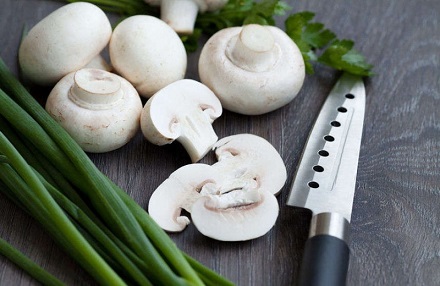Penn State College of Medicine Study Shows That The Phytochemical Ergothioneine Found In Most Edible Mushrooms Lowers Risk of Depression!
Source: Phytochemical News Oct 12, 2021 3 years, 5 months, 2 weeks, 6 days, 10 hours, 11 minutes ago
A new study by researchers from Penn State College of Medicine has found that the phytochemical cum antioxidant found in most common edible mushrooms ie
Ergothioneine, lowers the risk for depression.

The consumption of mushrooms has been making headlines due to their many health advantages including lowering one's risk of cancer and premature death, but this new study findings now reveals that mushroom consumption may also benefit a person's mental health.
Mushrooms contain numerous bioactive compounds that may be associated with reduced anxiety including vitamin B12, nerve growth factor, antioxidants, and anti-inflammatory agents. We hypothesized that mushroom consumption is associated with a lower risk of depression in American adults.
The study team used data from the National Health and Nutrition Examination Survey 2005-2016. Up to two days of 24 h dietary recall were analyzed to assess mushroom intake frequency. Depression was measured using the Patient Health Questionnaire (PHQ-9, score ≥ 10). We used multivariable logistic regression models, adjusting for potential confounding factors.
The study findings showed that among 24,699 participants (mean (SE) age: 45.5 (0.3) years), the weighted prevalence of depression was 5.9%.
Mushrooms were consumed by 5.2% of participants. Compared with the lowest tertile of mushroom intake, participants in the middle tertile (median intake = 4.9 g/d, number of cases = 16) had lower odds of depression (adjusted OR = 0.31; 95% confidence interval [CI] 0.16, 0.60) while those in the highest tertile did not differ (median intake = 19.6 g/d, adjusted OR = 0.91; 95% CI: 0.47, 1.78, number of cases = 22) (P-trend = 0.42).
The study findings showed that mushroom eaters had a lower odd of depression. However, a dose-response relationship was not observed.
The study findings were published in the peer reviewed Journal of Affective Disorders by Science Direct (Elsevier)
https://www.sciencedirect.com/science/article/abs/pii/S016503272100759X
The study team believes that the phytochemical called Ergothioneine found in mushrooms which is also a strong antioxidant, could be responsible for the lowering of the symptoms of depression. It is also a strong anti-inflammatory agent.
Ergothioneine is a naturally occurring amino acid and is a thiourea derivative of histidine, containing a sulfur atom on the imidazole ring. This compound occurs in relatively few organisms, notably Actinobacteria, Cyanobacteria, and certain fungi. In humans, ergothioneine is acquired exclusively through the diet and accumulates in erythrocytes, bone marrow, liver, kidney, seminal fluid, and eyes.
The phytochemical antioxidant is also found in small amounts in red and black beans.
The study team data on diet and mental health collected from more than 24,000 U.S. adults between 2005 and 2016. The team found that individuals who ate mushrooms had lower odds of having
depression.
The study team said that mushrooms contain ergothioneine, an antioxidant that may protect against cell and tissue damage in the body. Studies have shown that antioxidants help prevent several mental illnesses, such as schizophrenia, bipolar disorder and depression.
Lead author Dr Djibril Ba from the epidemiology department at Penn State College of Medicine told Thailand Medical News, "Mushrooms are the highest dietary source of the amino acid ergothioneine ie an anti-inflammatory which cannot be synthesized by humans. Having high levels of this may lower the risk of oxidative stress, which could also reduce the symptoms of depression."
Agaricus bisporus or white button mushrooms, which are the most commonly consumed mushroom variety in the U.S., contain potassium, which is believed to lower anxiety.
In addition, certain other species of edible mushrooms, especially Hericium erinaceus, also known as Lion's Mane, may stimulate the expression of neurotrophic factors such as nerve growth factor synthesis, which could have an impact on preventing neuropsychiatric disorders including depression.
The study also found that college-educated, non-Hispanic white women were more likely to eat mushrooms. The average age of surveyed participants was 45, and the majority (66%) were non-Hispanic white people.
The study team observed a significant association between mushroom consumption and lower odds of depression after accounting for socio-demographics, major risk factors, self-reported diseases, medications and other dietary factors. They said, however, that there was no clear additional benefit with relatively high mushroom intake.
Dr Joshua Muscat, a Penn State Cancer Institute researcher and professor of public health sciences added, "The study adds to the growing list of possible health benefits of eating mushrooms.”
The study team conducted a secondary analysis to see if the risk of depression could be lowered by replacing a serving of red or processed meat with a serving of mushrooms each day.
However, findings show that this substitution was not associated with lower odds of depression.
It was also stated that prior to this research, there have been few studies to examine the association between mushroom consumption and depression, and the majority have been clinical trials with fewer than 100 participants. The researchers said this study highlights the potential clinical and public health importance of mushroom consumption as a means of reducing depression and preventing other diseases.
The study team noted some limitations that could be addressed in future studies. The data did not provide details on the types of mushrooms. As a result, the team could not determine the effects of specific types of mushrooms on depression. Food codes issued by the U.S. Department of Agriculture were used to determine mushroom intake; therefore, some entries may have been misclassified or inaccurately recorded.
Thailand Medical News would further like to add that numerous other past studies have also extolled on the positive benefits of Ergothioneine from mushrooms on mental health and also its neuroprotective properties.
https://www.ncbi.nlm.nih.gov/pmc/articles/PMC4842932/
https://www.nature.com/articles/s41398-020-0855-1
https://www.sciencedirect.com/topics/pharmacology-toxicology-and-pharmaceutical-science/ergothioneine
https://www.sciencedirect.com/science/article/abs/pii/S030881461730691X
https://www.naturalmedicinejournal.com/journal/2020-04/mushrooms-brain-food
For more on
Ergothioneine, keep on logging to Thailand Medical News.
